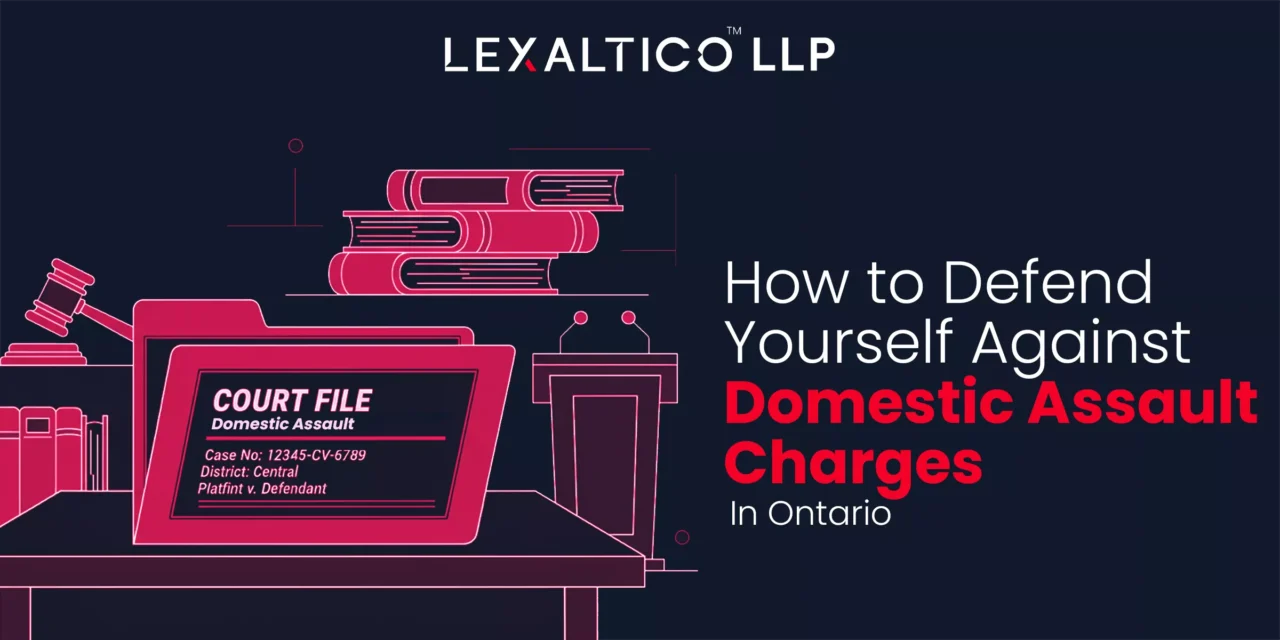Defending yourself against a domestic assault charge in Ontario can feel overwhelming, but understanding the legal framework and your rights is the first step toward a fair outcome. Domestic assault refers to any assault charge that involves an intimate partner or family member, and it carries unique procedural and social dynamics.
What Is Domestic Assault in Ontario?
Domestic assault refers to any assault that occurs in the context of an intimate or family relationship, such as between spouses, dating partners, or close relatives. The Criminal Code of Canada doesn’t have a separate “domestic assault” section, but the courts treat these cases more seriously due to their emotional and social impact.
Common examples include:
- Physical violence or threats against a partner
- Emotional or psychological abuse
- Damage to property during an argument
- Assaults involving weapons or injuries
You can learn more about domestic violence laws from the Ontario Ministry of the Attorney General.
What Happens After a Domestic Assault Arrest
Once police are called to a domestic dispute, someone is almost always arrested if there’s any sign of violence or threat. Police will lay charges if they have reasonable grounds to believe an assault occurred, even if the complainant doesn’t want to proceed.
After the arrest:
- You’ll likely face a no-contact order or bail conditions preventing contact with the complainant.
- You’ll appear before a judge for a bail hearing within 24 hours.
- If released, you must follow all bail terms or risk re-arrest.
Common Bail Conditions in Domestic Assault Cases

Typical bail conditions include:
- No direct or indirect contact with the complainant
- Not returning to the shared home
- Staying a certain distance away from the alleged victim
- Avoiding alcohol or weapons
- Courts sometimes order counselling or anger-management programs as a bail condition, depending on the circumstances.
These conditions can make daily life difficult, but breaching them is a criminal offence on its own.
Legal Defences Against Domestic Assault Charges
Every case is unique, but there are several common defences your lawyer may use, depending on the facts.
1. Self-Defence (Section 34 of the Criminal Code)
You have the legal right to protect yourself or others if you believe force was necessary and reasonable in the situation.
Key elements include:
- You acted because you believed you or someone else was in danger
- Your response was proportionate to the threat
- You did not continue to use force after the threat ended
More on this can be found in Section 34 of the Criminal Code of Canada.
2. Defence of Others
Similar to self-defence, this applies if you acted to protect someone else — such as a child or family member, from harm.
3. False Accusations or Mistaken Identity
Unfortunately, false accusations sometimes happen in emotionally charged situations, especially during separations or custody disputes. A skilled lawyer can challenge inconsistent statements, text messages, or timelines to show reasonable doubt.
4. Consent Defence (Limited Use)
In rare cases, consent can only apply where the physical contact was truly voluntary and caused no bodily harm; it cannot justify intentional violence., for example, if the alleged physical contact occurred during consensual physical activity and wasn’t meant as harm. However, this defence is very limited and depends heavily on the facts.
5. Evidence of Abuse or Battered Woman Syndrome
If you acted after enduring long-term abuse, your lawyer may introduce expert psychological testimony to explain your perception of danger, a principle known as Battered Woman Syndrome.
This is recognized by Canadian courts as part of the self-defence framework.
Using Past Abuse as Context
Courts will consider the history of violence between partners to understand the context of the assault. If you acted out of fear after years of abuse, that history can support a claim of self-defence or reduced responsibility.
Challenging the Crown’s Case
To convict you, the Crown must prove beyond a reasonable doubt that you intentionally applied force, threatened, or attempted to cause harm. Your lawyer can challenge the prosecution’s evidence by:
- Cross-examining the complainant for inconsistencies
- Presenting messages, photos, or witness testimony
- Highlighting missing or weak physical evidence
If the judge has any reasonable doubt, you must be acquitted.
Can Domestic Assault Charges Be Dropped or Withdrawn?
Sometimes, charges may be withdrawn if the Crown believes there’s not enough evidence or if the complainant changes their statement.
Your lawyer can negotiate a peace bond or diversion program in appropriate cases, especially if it’s your first offence or the injuries were minor.
Weapons and Self-Defence in Domestic Assault Cases

Using an object as a weapon isn’t automatically criminal, but your use of force must be necessary and proportionate. Excessive or retaliatory force can defeat a self-defence claim.
What to Do Immediately After an Arrest
- Stay silent and ask for a lawyer: Anything you say can be used against you.
- Follow bail conditions strictly: Don’t contact the complainant or go near restricted areas.
- Document everything: Keep a record of what happened, including texts, injuries, and witnesses.
- Hire an experienced criminal defence lawyer: Early legal advice can make or break your case.
Mitigating vs. Aggravating Factors
When sentencing, judges look at:
- Mitigating factors: no prior record, remorse, cooperation, or evidence of provocation
- Aggravating factors: use of weapons, repeat offences, harm to children, or breach of trust
A good lawyer can argue mitigating factors to reduce penalties or avoid a criminal record.
Best Practices for a Strong Defence
- Avoid discussing your case with anyone except your lawyer.
- Don’t post about the case on social media.
- Attend all court dates and counselling if required.
- Be proactive, completing therapy or anger management can help your defence.
Conclusion
Domestic assault cases are serious, but they’re also defendable. The key is to understand your rights, avoid rash actions, and get expert legal help as soon as possible.
A well-prepared defence can highlight inconsistencies, reveal context, and show that the situation isn’t as simple as it seems.
Quick FAQs
Yes, you can claim self-defence if you believed you were in danger and used reasonable force to protect yourself. The court will decide if your actions were necessary and fair based on the situation.
You must believe that force was being used or threatened against you, that your response was to protect yourself or someone else, and that your actions were reasonable. The judge looks at the situation to see if your reaction matched the threat.
Self-defence fails if you used more force than necessary or continued after the danger was over. The court expects your response to be reasonable, not revengeful.
Yes, evidence of past abuse can help explain your actions or fear during the incident. It gives the court context about the relationship and your state of mind.
You’ll appear before a judge who decides if you’ll be released and under what conditions. These conditions often include no contact with the complainant and staying away from shared places.
Yes, charges can be dropped if there isn’t enough evidence or through peace bonds or diversion programs. Your lawyer can negotiate this based on the facts and your background.
Weapons can only be used if absolutely necessary to stop an immediate threat. If your force was more than needed, it won’t count as self-defence.
It’s a psychological explanation of how long-term abuse affects a person’s response to danger. It helps the court understand why someone felt forced to defend themselves.
False accusations can happen during emotional or family conflicts. A lawyer can expose lies or inconsistencies through evidence and questioning.
Stay calm, don’t speak to police without a lawyer, and follow all bail conditions. Keep notes, gather evidence, and avoid posting anything about your case.
Disclaimer: The information provided in this blog is for general informational purposes only. It is not legal advice and should not be relied on as such.



